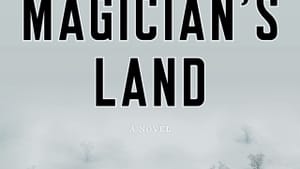Stay in the Loop
BSR publishes on a weekly schedule, with an email newsletter every Wednesday and Thursday morning. There’s no paywall, and subscribing is always free.
Finding the magic in adult life
Lev Grossman's 'Magician's Land'

Like most people of my generation, I was moderately obsessed with the Harry Potter series when it was at its height of popularity. The creation of the alternative Hogwarts world gave me hope that there was more to this world. It is this exact feeling that Lev Grossman builds upon with his contemporary fantasy series, The Magicians.
Each of the three novels is focused on Quentin Coldwater, a huge fan of a child’s fantasy series about a distant and magical land called Fillory. The fictitious Fillory series (which seems to be loosely based on C.S. Lewis’s Chronicles of Narnia) is about a group of English orphans, the Chatwins, who stumble upon a portal to a magical land, Fillory, in their aunt’s home during World War I. As it turns out, the Fillory series is based in truth: Fillory is real, and the Chatwins ruled over it for some time. Grossman’s characters journey to Fillory, which enthralls them the way I was enthralled with Hogwarts. At the same time, the characters are asking existential questions about the nature of creation and how to find meaning in the empty reality of the world.
Using the common fantasy trope of the quest, Grossman has Coldwater wondering what his quest will be and if it will ever find him. The characters search desperately for a calling in various worlds and struggle to feel connected to any of the worlds they adventure in. Magic for Quentin and the other characters is a way of dissolving the distance between mind and reality. Magicians can actually look at reality and change it. The most similar thing that we muggles have in this reality is art. Unless magic, sorcery, wizardry, or any of the like exists somewhere in this world — and I can’t say I don’t believe it possible — art is the closest approximation humans in this world have to something that closes the distance between reality and experience.
Finding answers
The final book of the trilogy, The Magician’s Land, was released in August of this year. In The Magician’s Land, Quentin has finally realized what his true calling is: to bring his first love, Alice, back into the world of living. Grossman is not subtle with his efforts to show how Quentin has matured into a more emotionally well-rounded and magically powerful character. Along his quest to bring Alice back, Quentin recovers a spell — stolen from Fillory by one of the Chatwin siblings — that would allow the caster to create a land. Thus, love and creation become the meaningful existence that Quentin had sought since the beginning of the first novel when he first found out he was a magician.
Eventually, Quentin is able to bring back Alice and save Fillory one last time from an apocalyptic ending. Upon returning back to Earth, Quentin and Alice cast the land-making spell, creating a bridge between the fourth floor of a Manhattan home to the magical land of Fillory. In doing this, Grossman solidifies the connection every fan of fantasy has ever hoped for, between this world and the world of wonder, magic, and possibility.
The Magician’s Land is the weakest of the series; Grossman is mostly concerned with checking off any loose ends that the previous two books had left dangling. However, Grossman overall is successful in providing a contemporary alternative to the fantasy paradigm. The meta-fantasy theme had me believing once again that the universes of famous fantasy novels could actually be possible.
Fantasy for adults
Grossman engages the reader’s material reality with his multiple layers of fantasy more effectively than the single-layer fantasy novels of Rowling, Lewis, or Tolkien before him. There are still pockets of magic to be found, even for adults — as we see by the fact that many of the characters are well into adulthood in the series.
Grossman understands that his audience includes many people who less than ten years ago were waiting for their letter from Hogwarts. Further, the philosophical questions that Grossman has Quentin ask are pertinent to that same demographic. Quentin and the other characters are asking the questions and living in the precariousness that is becoming universal for the modern twentysomething. Not just “what is the meaning of life,” but “how do I create meaning given that the options are severely limited by the contemporary, capitalist world?” For Grossman, the answers are art and love, the two most effective ways to resist the onslaught of expectations surrounding adulthood and capitalist society.
In creating a land with Alice, a land that connects to the magical world of Fillory, Quentin is successful in creating meaning in this world, the real world. Not only does he create meaning, but he is also able to stay true to the character that he was in the beginning of the series and who he has become in The Magician’s Land. Though the finale of the series is possibly the weakest, it might be the most significant in a truly captivating coming-of-age narrative.
What, When, Where
The Magicians Trilogy, by Lev Grossman: The Magicians (2009), The Magician King (2011), and The Magician’s Land (2014). Viking Press. levgrossman.com/magicians-trilogy/
Sign up for our newsletter
All of the week's new articles, all in one place. Sign up for the free weekly BSR newsletters, and don't miss a conversation.
